

Start-ups are growing like never before thanks to economies of scale. Airbnb is perhaps one of the most famous 'unicorns'.
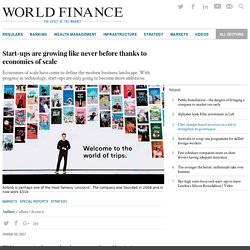
The company was founded in 2008 and is now work $31b Author: Callum Glennen October 30, 2017 Within start-up incubators and accelerators across the world, aspirations are constantly high. Internet start-ups always begin tiny, but come armed with future plans of global success. Incredibly, this is often a plausible target: the likes of Airbnb and Uber have proven as much, and have given entrepreneurs solid justification for dreaming big. The goal for most of these start-ups is the pursuit of an economy of scale; growing the business to a point where it is so large it can offer products or services at a rate that simply cannot be matched by smaller competitors.
The 21st century has been defined by the opportunities and possibilities opened up by technology, particularly the internet, producing businesses capable of growing swiftly to sizes that would have been impossible in the past. ‘Homebase is the most disastrous retail acquisition in the UK ever’ It’s an Aussie institution in crisis after aggressive management led to disgrace and embarrassment overseas.
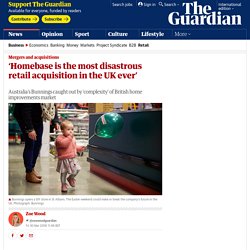
It also knows a thing or two about sandpaper. This is not the country’s cricket side, but Bunnings, the Australian DIY retailer, that set out to conquer Britain by revamping Homebase but ended up writing off A$1bn (£547m) after a catalogue of major mistakes. The coming days will be critical to Bunnings’ future in the UK, as Britons emerge from winter hibernation to go shopping, buying the plants and materials for the gardening projects, weather permitting, they will start to tackle over the Easter weekend. “Homebase is undoubtedly the most disastrous retail acquisition in the UK ever,” says GlobalData’s retail analyst, Patrick O’Brien. “I can’t think of a worse one that has made these kinds of losses so quickly. “The double bank holiday is extremely important for DIY retail because it sets the tone for spring/summer,” he says.
NPR Choice page. From click to chic: Amazon trials real-world fashion boutique. Bright red lacy dresses, cosy coats and ripped jeans fill a chic central London boutique decorated with neon signage and stripped wood floors.
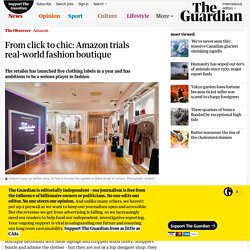
Shoppers bustle and admire the clothes – but they are not in a hip designer shop; they are in Amazon’s first pop-up fashion store in Europe. Last week, at the opening night of the Baker Street store, the models Lara Stone and Maddi Waterhouse, the actress Gemma Chan and socialites Pixie Geldof and Rafferty Law brought a sprinkling of stardust to a collection that the US online retailer hopes will make it a major player in British fashion. The company began selling clothing in the UK only a decade ago but is already snapping at the digital heels of the high-street stalwart Marks & Spencer, with a 4.6% share of the online clothing market. In the past year it has stepped up activity with the launch of five own-labels – the latest of which is Aurique, an activewear brand that debuted last month. Coca Cola Buys Costa Coffee. 3.9.1 Greiner's Model of Growth. Tata Steel to merge European operations with ThyssenKrupp. India’s Tata Steel has paved the way for a merger of its European operations with the German steel manufacturer ThyssenKrupp, creating Europe’s second largest steel group after ArcelorMittal.
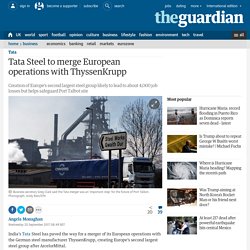
Tata said the two companies had signed a “memorandum of understanding” to create a 50/50 joint venture based in Amsterdam, with an annual turnover of about €15bn (£13.3bn), 48,000 employees, and annual shipments of about 21m tonnes of flat steel. The two companies have been in talks to combine their European operations since Tata abandoned plans to sell its UK steel business last year, safeguarding the immediate future of the Port Talbot steelworks in south Wales. A major hurdle to the merger was removed last month, when Tata reached an agreement over its £15bn pension scheme. The tie-up is expected to result in about 4,000 job losses, split between the two companies and affecting both administrative and manufacturing roles. 3.9.1 Business Growth Strategy - Horizontal and Vertical Integration. 3.9.1 Global Joint Ventures - Uber Partners with Volvo.
As the Guardian reports here, Volvo Car Group and ride-sharing service Uber have entered into a $300 million (50:50) joint venture to develop autonomous driving vehicles.
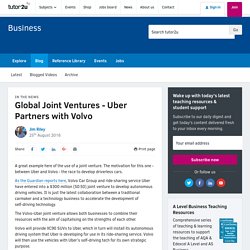
It is just the latest collaboration between a traditional carmaker and a technology business to accelerate the development of self-driving technology. The Volvo-Uber joint venture allows both businesses to combine their resources with the aim of capitalising on the strengths of each other. 3.9.1 Is Apple Looking for External Growth - the Media Sector? 3.9.1 - Retrenchment at Ralph Lauren as 1,000 Jobs Cut. 3.9.1 Stages Of Business Growth. 3.9.1 Mergers and Acquisitions. 3.9.1 How Franchising Works: An illustrated guide. 3.9.1 Exploring the franchise business model. 3.9.1. Business Growth Strategy - Mergers. 3.9.1 How growth drives change. 3.9.1 Christmas cheer for gin distillers. 3.9.1 What is overtrading? - Small Business. Overtrading takes place when a business accepts work and tries to complete it, but finds that fulfilment requires greater resources of people, working capital or net assets than are available.
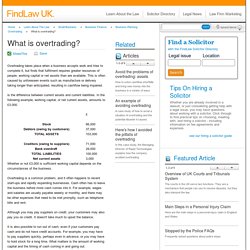
This is often caused by unforeseen events such as manufacture or delivery taking longer than anticipated, resulting in cashflow being impaired. is the difference between current assets and current liabilities. In the following example, working capital, or net current assets, amounts to £3,000. Whether or not £3,000 is sufficient working capital depends on the circumstances of the business. Overtrading is a common problem, and it often happens to recent start-ups and rapidly expanding businesses. Although you may pay suppliers on credit, your customers may also pay you on credit.
It is also possible to run out of cash, even if your customers pay cash and do not have credit accounts. This content is subject to Crown Copyright Source: Business Link. 3.9.1 Greiner Curve - Strategy Tools training. Surviving the Crises That Come With Growth Growth requires changes at various points.

3.9.1 - John Lewis takes the low risk approach to international growth. John Lewis is set to expand into the Australian market, with plans to launch six concessions in department store chain Myer by 2017.

It is anticipated the UK retail giant will open its first shop-in-shop before Christmas in Myer's new Warringah estate in Sydney's northern beaches district. John Lewis will then expand to Melbourne, Perth, Bondi in Sydney's east, Chadstone in Melbourne's south-east and in downtown Sydney by early 2017. The Australian expansion would bring the number of John Lewis concessions to 30 worldwide. ”We’re delighted to be expanding our international presence and bringing John Lewis to new countries around the world, both through physical collaborations and by expanding our online international delivery destinations," head of international development Katie Jordan said.
Keep up to date with Retail Gazette by liking us on Facebook John Lewis first expanded into Europe last year, opening a concession in Dutch department store chain de Bijenkorf. 3.9.1 - Retrenchment for Macys. 3.9.1 - More Focus and Retrenchment from Dave Lewis at Tesco. 3.9.1 Jamie Oliver to close six restaurants in tough market; after Brexit vote. Jamie Oliver is to close six of his Italian restaurants after tough trading and the “pressures and unknowns” following the Brexit vote.
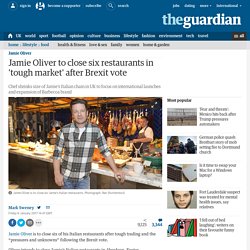
Oliver intends to close Jamie’s Italian restaurants in Aberdeen, Exeter, Cheltenham, Richmond, Tunbridge Wells and Ludgate Hill, near London’s St Paul’s Cathedral, by the end of the first quarter of the year. “As every restaurant owner knows, this is a tough market and post-Brexit the pressures and unknowns have made it even harder,” said Simon Blagden, chief executive of the Jamie Oliver Restaurant Group. The closures will affect about 120 employees, less than 5% of the restaurant chain’s total staff, and the company aims to offer them alternative jobs at other Jamie’s Italian outlets.
“These closures are in no way a reflection on the dedication and commitment of our staff and my first priority is to try and secure those affected alternative jobs,” said Blagden. “Where this isn’t possible, we’ll be working with them to find alternative employment.” 3 9 1 Causes of Change Retrenchment. 3.9.1 Frankie & Benny’s owner closes 33 restaurants. The company behind Frankie & Benny’s, Chiquito, Coast to Coast and Garfunkel’s is closing 33 restaurants after reporting falling sales and profits.
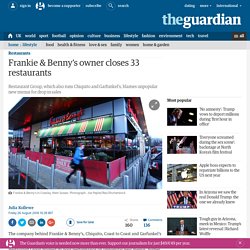
Restaurant Group blamed its poor performance on unpopular new menus, higher prices and poor customer service, and said it would listen more to its customers in the future. It runs more than 500 restaurants across the UK and Frankie & Benny’s is its biggest brand. The company posted a 3.9% fall in like-for-like sales and a 4.4% fall in operating profits to £37.5m in the 27 weeks to 3 July. It took a one-off charge of nearly £60m for the 33 site closures and writedown of 29 other outlets. The group has ousted its chief executive and chief financial officer in recent months and appointed two new non-executive directors to its board to chair the remuneration and audit committees, after suffering a damaging shareholder revolt over boardroom pay in May. 3.9.1 Google and GSK form venture to develop bioelectronic medicines. GlaxoSmithKline has teamed up with Google’s parent company Alphabet to develop miniature electronic implants for the treatment of asthma, diabetes and other chronic conditions.
GSK, Britain’s biggest drug company, said it would form a joint venture with Verily Life Sciences, a division of Alphabet, to work on research into bioelectronic medicines. GSK will own 55% of Galvani Bioelectronics, and Verily will hold 45%. Galvani will be based at GSK’s global research and development centre at Stevenage, Hertfordshire, just north of London, and will have a second research hub at Verily’s base in San Francisco.
The companies will combine their existing intellectual property rights and invest up to £540m over seven years if the collaboration meets certain goals. 3.9.1 Strategy After the Takeover: DW Fitness and Fitness. 3.9.1 HCM DW Fitness First Takeover. 3.9.1 More Retrenchment as Panasonic Tries to Stem the Losses. Panasonic, like several other Japanese electronics firms (including our blog favourite Sony), appears to be in deep trouble. I hadn't quite appreciated the scale of the problems facing Panasonic until I came across this report on Reuters which describes how Panasonic plans to cut a further 10,000 jobs from its workforce, on top of the 36,000 jobs that it shed last through through business sales and closures.
By any measure that is a significant programme of retrenchment, although to put the number into some perspective, Panasonic still employs around 300,000 people. 3.9.1 Takeover Strategy: Can Wimpy Move Upmarket with GBK Takeover? 3.9.1 - Horizontal Integration on The Menu as Just East Swallows Hungry House. A fascinating takeover was announced at the end of 2016 which, if it is cleared by the competition regulators, will significantly change the nature of competition in the UK takeaway ordering market. Just Eat announced that it had agreed to purchase Hungry House for a consideration of between £200-240m depending on the performance of Hungry House over the coming months. The proposed takeover will now be scrutinised by the Competition & Markets Authority (CMA) as it potentially raises issues of competition, with the UK market leader buying the number two player in the market.
Why buy your closest and largest competitor? The answer lies in the final part of the following text from the takeover announcement: According to Just Eat: The Acquisition would generate significant benefits for Just Eat’s restaurant partners and customers. So this takeover is all about enabling Just Eat the reduce its unit costs by creating economies of scale and obtaining cost synergies. 3.9.1 A Disastrous Takeover for Toshiba. 3.9.1 Why do businesses grow? There are many reasons that help to explain the motivations for businesses to grow 1. Profit motive: Businesses grow to achieve higher profits and provide better returns for shareholders The stock market valuation of a firm is influenced by expectations of future sales and profit streams so if a company achieves disappointing growth figures, this can be reflected in a fall in the share price. This opens up the risk of a hostile take-over and also makes it more expensive for a quoted company to raise fresh capital by issuing new shares.
3.9.1 What is Facebook exactly? Zuckerberg's archived… 3.9.1 Tesco acquires Booker to become UK biggest food… 3.9.1 Peugeot in talks to buy GM's Vauxhall and Opel business. Image copyright Vauxhall France's PSA Group, maker of Peugeot and Citroen cars, is in talks about taking over General Motors' (GM) loss-making European business Opel.
PSA, which already works with GM in Europe on several projects, said a takeover was among "numerous strategic initiatives" being considered. Any deal would involve Opel's UK arm Vauxhall, which employs 4,500 staff at plants at Ellesmere Port and Luton. Unite union leader Len McCluskey said he wanted urgent talks with GM. "My priority now is to speak to General Motors to seek immediate assurances for the UK plants and this loyal workforce. "I'll also be seeking urgent conversations with the government, because everything must be done to secure our world-class automotive industry," he said. In addition to the employees at Vauxhall's manufacturing sites, the company said that 23,000 people worked in the retail network and 7,000 in its UK supply chain. 'Potential acquisition'
Tesco's new discount chain Jack's takes on Aldi and Lidl. Media playback is unsupported on your device.